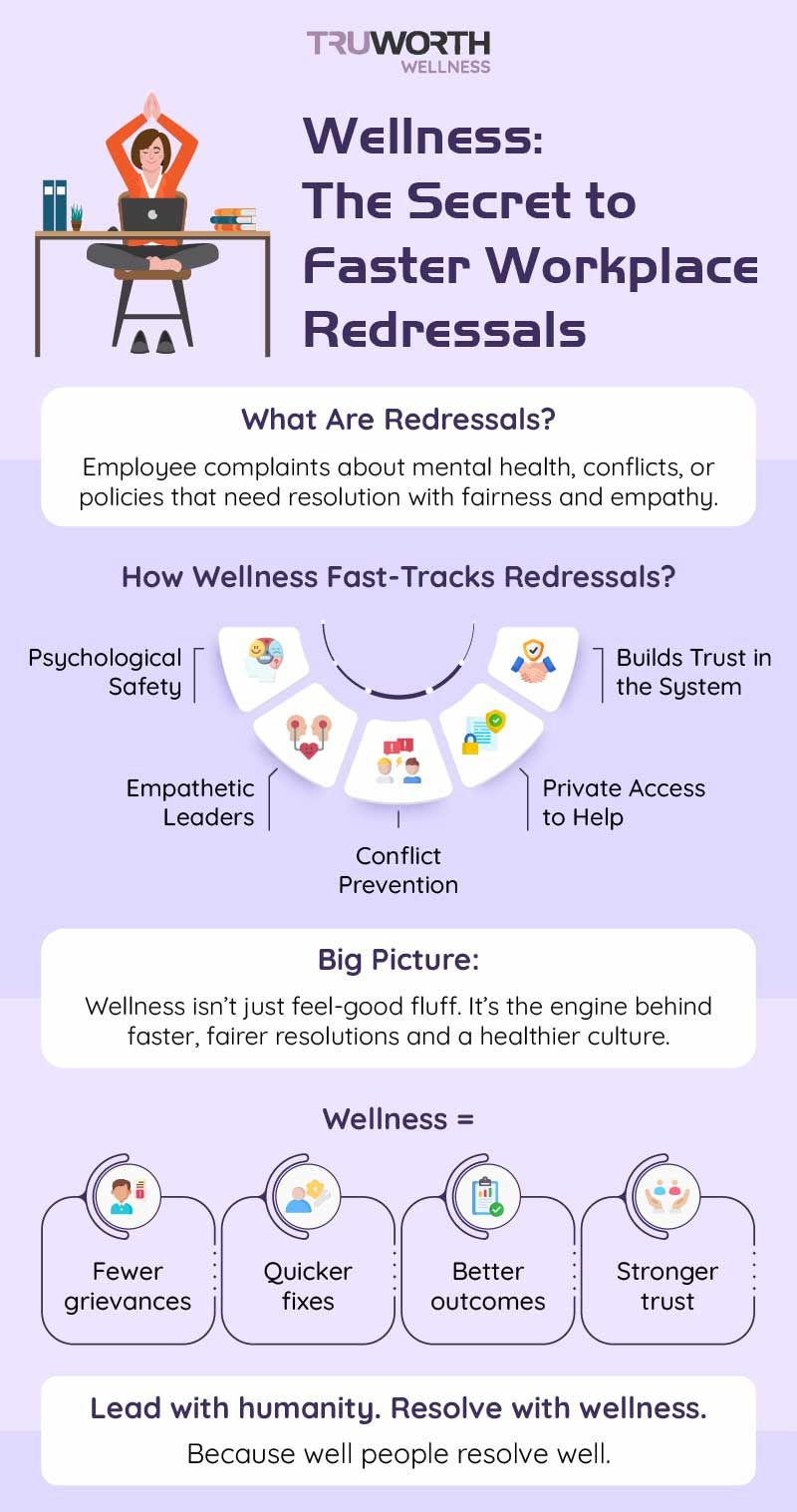How Wellness Programs Accelerate Redressals? The Hidden Power Within

Imagine a workplace where grievances don’t pile up, conflicts don’t escalate, and issues are resolved before they become headlines in an HR audit. Now imagine the secret ingredient behind this harmony isn't more rules or faster technology—but something deceptively simple: wellness.
It may sound counterintuitive at first. What does a yoga class, a mental health app, or a flexible work policy have to do with redressals—the formal processes of handling complaints, conflicts, and concerns? Everything.
Wellness programs, when done right, do far more than boost morale or reduce sick days. They transform how people feel, think, and interact at work. And in doing so, they radically reshape how quickly and effectively issues get raised and resolved. Let’s dig into how wellness initiatives are quietly becoming the fast lane to fairer, faster redressals.
Must Read: In An Era Of Mistrust On Health Information, Corporate Wellness Programs Are The Key

What Do We Mean by “Redressals”?
Redressals are the mechanisms that help employees resolve complaints, whether they’re related to workplace behavior, mental health challenges, interpersonal conflicts, or organizational policies. They’re crucial for maintaining fairness, trust, and transparency. But even the best-designed redressal system can fall short if the workplace culture doesn’t support openness and empathy.
That’s where wellness programs come in—not as a soft solution, but as a structural accelerator.

How Wellness Programs Speed Up the Redressal Process?
1. They Create Psychological Safety
A workplace where people feel mentally and emotionally safe is a workplace where people are more likely to speak up. Wellness programs focused on mental health, inclusivity, and emotional well-being lay the groundwork for a culture of trust.
When employees feel safe, they don’t wait until problems boil over—they report early, reducing both the complexity and timeline of redressals.
2. They Train Empathetic Leaders
Wellness initiatives often include coaching for managers on emotional intelligence, active listening, and supportive leadership. These trained leaders can identify distress signals early, mediate before escalation, and respond with compassion.
This proactive leadership shortens the feedback loop and leads to swifter, more thoughtful resolutions.
3. They Minimize the Root Causes of Conflict
Toxic work cultures don’t just “happen”—they’re the product of stress, burnout, unclear communication, and unmet needs. Wellness programs target these root issues, leading to fewer incidents that require redressal in the first place.
When people are well, they’re more patient, collaborative, and resilient—making your workplace less reactive and more balanced.
4. They Offer Direct, Private Access to Help
Many wellness programs now include mental health hotlines, anonymous reporting tools, or Employee Assistance Programs (EAPs). These provide immediate, confidential pathways for employees to share concerns, which are then directed to the right channels—without delay or red tape.
Fewer bottlenecks = faster redressals.
5. They Foster Trust in the System
When an organization prioritizes well-being, employees don’t just feel better—they believe their voices matter. That trust encourages faster reporting, more honest disclosures, and fuller participation in resolution processes.
Wellness builds credibility—and credible systems work faster and more effectively.

The Big Picture: Wellness as a Workplace Accelerator
It’s easy to think of wellness as something peripheral—a break from "real work." But forward-thinking organizations now understand that wellness is the infrastructure for everything else: collaboration, creativity, decision-making, and yes—conflict resolution.
In the context of redressals, wellness programs:
- Reduce the need for formal intervention
- Increase the speed of resolution
- Improve the quality of outcomes
- Strengthen the culture from which conflicts arise
Conclusion: Resolve with Humanity, Lead with Wellness
The most advanced redressal systems aren’t built on paperwork or policies—they’re built on people who feel heard, seen, and supported. Wellness programs are the bridge between operational efficiency and human sensitivity. They create the conditions for redressals to be swift, sincere, and sustainable.
In a world where employee experience is everything, wellness is no longer optional—it’s non-negotiable. Because when people feel well, they don't just work better—they resolve better too.

